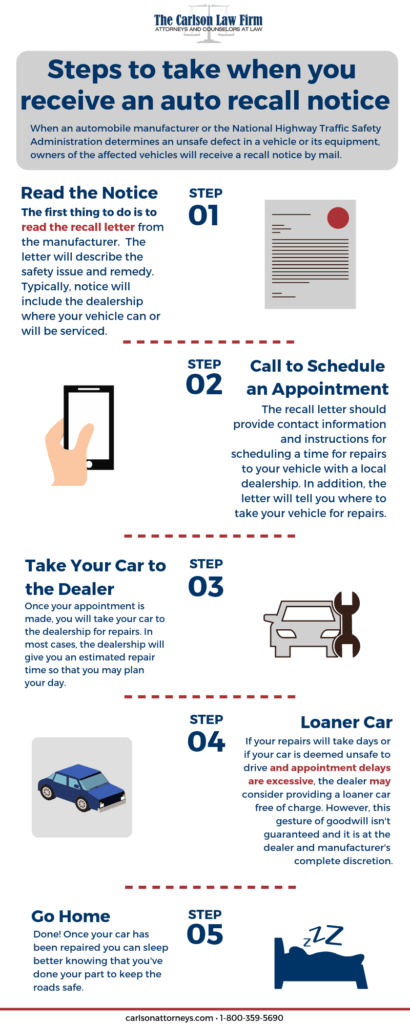Tucked in between all the junk mail in your mailbox, a notice comes from an automaker: your car has a recall. But is the recall legitimate or not? Do you open the envelope or toss it along with those credit card offers?
Vehicle recalls are a huge concern because of the catastrophic injuries and deaths that have resulted from defective motor vehicles and auto parts. The problems arising from recalls can be as simple as incorrect labeling to defects that lead to fires, crashes, and serious injuries from faulty airbags. Despite their importance, nearly 60 million vehicles on the road have at least one outstanding auto recall. Sometimes, motorists may be unaware of a recall on their vehicle. These outstanding auto recalls may occur because the vehicle is pre-owned and the current owner did not receive a notification, or perhaps the car owner simply missed the mailed notification and news reports of the recall.
No matter the reason, it is important for car owners to make time to get recalls repaired. Periodically checking on the recall status of your vehicle will keep you, your loved ones and other motorists on the road safe.

Who Oversees Auto Recalls?
Recalls are issued when a car manufacturer or The National Highway Traffic Safety Administration (NHTSA) determines that a vehicle or its equipment creates a safety risk or fails to meet minimum standards. In most cases, manufacturers make voluntary recalls to correct a safety issue prior to involvement from NHTSA.
NHTSA is the federal agency responsible for regulating the safety of vehicles. For example, the agency governs auto recalls when a vehicle or a part does not meet the legal requirements for safety. Since The National Traffic and Motor Vehicle Safety Act was enacted in 1966, more than 390 million cars, trucks, buses, recreational vehicles, motorcycles, and mopeds have been recalled to correct safety defects.
If a car manufacturer finds a problem with the vehicle that could be a safety hazard, they are required to notify owners by mail within 60 days of notifying NHTSA of a recall decision. Whether NHTSA or the car company itself issues the recall, NHTSA will oversee the recall and ensure the manufacturer complies with the law.
When Is a Recall Necessary?
A recall is issued when it has been determined that a vehicle, equipment, car seat, or tire creates an unreasonable safety risk failing to meet the minimum safety standards.
A safety defect is a problem existing in a motor vehicle or item of motor vehicle equipment which:
- Poses a risk to motor vehicle safety
- May exist in a number of vehicles of the same design or manufacture, or items of equipment of the same type and manufacture.
Common Vehicle Defects That Lead to Recalls
While vehicle recalls may be inconvenient and require owners to take time out of their schedules to sit in an auto repair shop, they are also necessary. Car safety has improved tremendously since the first true gasoline automobile was invented 134 years ago. Although the population and the number of vehicles on the road have increased tremendously, today’s vehicles now have several safety features that have contributed to significant declines in car crash fatalities. Whenever there is a defect in this equipment, it can lead to serious accidents and injuries.
The most common auto safety recalls include the following:
- Airbags that do not deploy or deploy when they shouldn’t
- Airbags that deploy with too much or too little force
- Faulty ignition switch
- Accelerator controls that may break or stick
- Seatbelts that don’t stay fastened during a collision
- Roofs that collapse during a rollover collision
- Faulty electric systems which cause fires
- Seats or seat backs that fail unexpectedly during normal use
- Brake failure
- Power steering failure
- Tire explosion
If ever you receive a notification that there is a defect affecting the safety of your vehicle, you should have it serviced immediately. An outstanding auto recall can lead to a crash resulting in permanent or life-altering injuries.
How Will I Know If There Is a Recall?
Typically, if a recall arises, by law, car manufacturers must inform car owners directly. Manufacturers get mailing information through your state’s registration database. Because of this, it is important that you do your part in making sure your vehicle registration is up to date with your current mailing address. The recall notification will contain three important pieces of information:
- A detailed explanation of what caused the defect
- Instructions on how to resolve the issue—including where you can take your vehicle for repairs
- Contact information if the car owner needs more information regarding the recall
If you are aware of a recall on your vehicle but have not received a notification directly from the car manufacturer, contact NHTSA and advise them so they can make sure the car manufacturer is following the law.
Where Else Can I Check for Outstanding Auto Recall Information?
Today, drivers can rely on online search tools to find out if their car has an open or unfixed recall. You can search to find out if your vehicle has any recalls by entering your vehicle identification number (VIN) at https://www.nhtsa.gov/recalls Your VIN is 17 digits and can be located in the following places:
- Lower left side of your car’s windshield
- Registration card
- Insurance card
Life can be hectic, and drivers may forget to check for recent recalls. But our attachment to our smartphones may come in handy. Safecar has an app available to ensure you are up to date on the latest recall information. You can sign up to receive e-mail recall notifications affecting your make and model from NHTSA or download the Safecar mobile application for iPhones or Safecar mobile application for Androids to receive recall alerts.
How Do Tire Recalls Differ From Other Vehicle Safety Recalls?
Your tires are your first line of defense against car crashes. They are the only piece of equipment on your vehicle that has direct contact with the road. Just one minor defect can lead to a tire blowout resulting in an auto collision. For these reasons, NHTSA treats tire recalls different from other auto recalls.
Unlike vehicle recalls, tire recalls have an expiration date. Once notified, a consumer has just 60 days to return the tire in order for the tire to be replaced at no cost to you. It is important to note, however, that enforcement of this rule varies by manufacturer and many companies will continue to replace recalled tires for several years.
How Do I Find Out If I Have an Outstanding Recall On My Tires?
The best way to find out if your tires have been recalled is to stay up to date on the latest recall news. One way to do this to set up a Google Alert. Another to check the recall status of your tires is to visit the U.S. Tires Manufacturers Association and use their Tire Recall Lookup tool.
Tire recall notifications will include a range of dates when the tires in question were manufactured. To determine if your tires are included in the recall, you will need the DOT Tire Identification Number (TIN). Under federal regulations, the DOT TIN must begin with the letters DOT followed by a series of characters. At the end of the DOT number, will be a set of numbers indicating the date the tire was made. For example, the number 1518 would indicate that the tire was manufactured in the 15th week of 2018. NHTSA only gives date ranges, however, you can use a week-of-the-year calculator to match the TIN to the dates given by NHTSA.
Vehicle Owner’s Rights and Responsibilities During a Recall
It is the car manufacturer’s responsibility to repair the issue without cost to the vehicle owner. Instructions will include information such as how a vehicle owner should seek repairs. If NHTSA and the car manufacturer disagree on a recall, the manufacturer has no obligation to repair the issue during the time they are in court.
When it comes to repairs, vehicle owners should be aware of the following:
Rights:
- A car owner may receive a refund for the cost of repairs if the car owner repaired the issue before the recall.
- Recall repairs should be within a required period of time and are typically repaired by mechanics at the car dealership.
- The car owner may contact the manufacturer if the car dealership is refusing to fix the vehicle within that time period. The vehicle owner cannot take legal action during this time.
- There is no deadline for recall repairs. Safety recalls are effective for the life of the vehicle.
- Vehicle owners can seek legal remedies if they have suffered injuries as the result of a recall.
Responsibilities:
- Owners must cover the cost of recall repairs if the vehicle is over 10 years old.
- If a manufacturer disagrees with NHTSA about a recall, the manufacturer may petition the court. When this occurs, the manufacturer does not have to repair the vehicle while the case moves through the courts. Owners should keep all documentation repairing a problem if they intend to get a refund from the manufacturer.
Can I Report a Safety Problem?
If you suspect your vehicle may have a defect putting your safety at risk, take the important step of reporting it to the NHTSA to get the situation remedied to ensure your safety. If the agency receives enough reports regarding the same product that could indicate a safety-related defect may exist, they will begin an investigation. You have three options to file such complaints:
Vehicle Safety Hotline. You may call 1-888-327-4236 toll free to register complaints or to receive recall information about a vehicle.
Safecar.gov. If you prefer to file a safety complaint online, you may visit this link to help facilitate the recall process.
U.S. Mail. You may also report a safety complaint by mailing a letter to:
- U.S. Department of Transportation
National Highway Traffic Safety Administration
Office of Defects Investigation (NVS-210)
1200 New Jersey Avenue SE
Washington, DC 20590
The information you provide to NHTSA will be entered in the consumer complaint automated database. This information is cataloged by vehicle make, model, model year, manufacturer and the affected part, assembly or system. Additionally, you may view complaints filed by other vehicle owners by searching the year, make and model of your vehicle on the NHTSA website. However, the best way to know if your specific vehicle has a recall is to search by your car’s VIN.
Do not ignore a safety recall. Further, if you suspect a safety defect you should alert NHTSA. Protect yourself and your loved ones from outstanding auto recall injuries.
How The Carlson Law Firm Can Help
Product liability cases are often complex cases, and take a highly experienced attorney to determine liability and aggressively pursue damages. Those who suffer harm because of a defective product may be eligible to receive compensation for losses such as medical expenses, lost wages, lost future income, pain, suffering, and more.
The Carlson Law Firm has more than 40 years of success protecting your rights and fighting for you. Our qualified attorneys can help you through your recovery after a serious injury or loss caused by an auto defect. We work on a contingency basis, which means you will not have to pay us unless we recover on your behalf. We care, and we can help.





